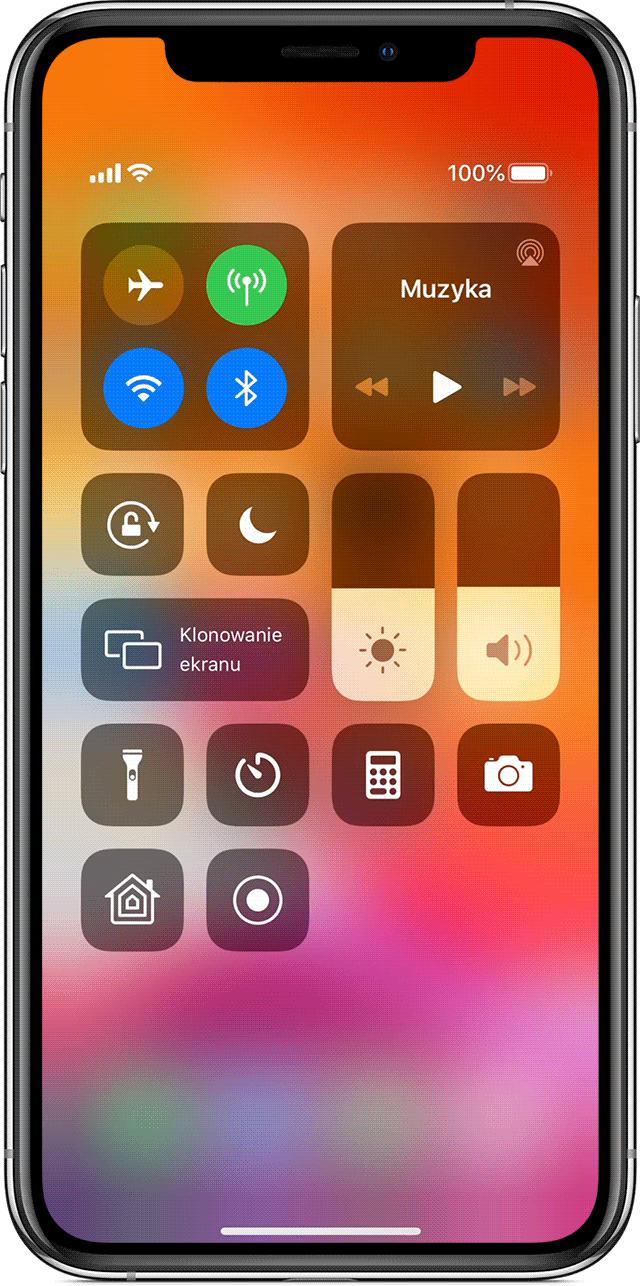Steve Jobs presenting the 1st generation of the iPhone in 2007
Everything that the producers "push us" as an amazing novelty is pushing the world of smartphones forward, but none of them can make a big leap, which will cause surprise and a big "WOW!" This is really great news! ”. Seriously, when was the last time you reacted like this by reading about new smartphones? Exactly.
Let us get carried away by the imagination. What will revolutionize the world of smartphones?
Of course, the list of expected new products in smartphones will be different for everyone. For some, it will be sufficient to get your device from 0 to 100% charging in seconds - and that's absolutely fine.
However ... what would I expect from a smartphone of the future? The smartphone of the future, i.e. the one that comes to mind as soon as we think about the abstract world full of robots, automation and electronics at every step.
Let's start calmly - maybe a smartphone without frames around the screen?
This is probably the most likely change that will soon enter the world of smartphones. Perhaps, therefore, the wish that the frames around the screen do not exist is a bit exaggerated, because similar devices are already appearing - but this is still a solution that is not used on a large scale.
All kinds of notches (such as in the new 13 series iPhones), "tears" or round cutouts for the front cameras are not that problematic, but if they weren't - they take a certain part of the screen, and this in effect spoils the overall reception smartphone front. What if the frames around the display did not exist at all, and the sensors and lenses of the front cameras were hidden under the screen (so that they were not noticeable)?
Personally, I have the impression that the frames and cutouts in the screen expose the handicaps of smartphone manufacturers who want the screen to cover the entire front of the device, but cannot do it due to the necessity to make sacrifices associated with it.
Cool what? Not only will we save space in this way, which will reduce the size of the device itself, but we will return to watching the screen in the same way as we do in the case of televisions or phones that were formerly smart.
Frames and notches seem to keep getting smaller, but ... they still are
Miniaturization is the key word of our time. Everything that currently covers and reduces the area of the projected image is a demonstration of the lack of appropriate technological knowledge to get rid of this problem. We're used to having all kinds of distractions somewhere on the screen, but they didn't get there because it looks nice - and because technology doesn't allow it to be done otherwise.
A little more abstract - the smartphone is a remote control for everything
Keys to the house, sheds with a garbage can, garage, staircase, car - that's a minimum of 5 irritating items in your pocket, and as we all know - often there are definitely more of them in a keychain. Annoying huh? For me, at least very much.
Now, pop, and you replace all these keys with a smartphone. Regardless of whether it is unloaded or not - you approach the house, grab the door handle and the lock opens automatically when it recognizes you. Car? Since there are keyless access systems, how much easier would it be if a smartphone were enough instead of a card?

Let's go a bit further and through the eyes of our imagination, let's create a world in which smart home is not a toy for technological freaks, but everyday life.
Yes, security when controlling and opening everything with a smartphone is the biggest barrier, but ... it's worth dreaming about.
Well, it is also worth supporting the development of technology.
Although many of us already have at least one element of a smart home in the apartment, it is still a technology that we do not fully trust, and perhaps that is why it is difficult to break through to the wider community. Does not matter.
The important thing is that a real smartphone of the future should, in my opinion, make me forget about physical buttons, knobs and all kinds of controls at home. Apart from economic issues (which are of course very important in the light of the constantly increasing electricity prices) - because the computer will not forget to turn off the light when you go to work and can distribute heat in such a way that its production is not wasted - this is it's simply incredibly comfortable in the world.
Also read:4:00 p.m., winter, you leave work and you have a 30-minute drive home: the smartphone notices that you are leaving the office and prepares the temperature at home to the perfect level for you, and also informs the coffee machine to brew it 3 minutes before you enter the house. coffee - so that it is perfect for drinking. The TV is already waiting for you with the next episode of your favorite series on Netflix launched, and the recently dressed Christmas tree and decorations outside have been flashing with light for a few minutes due to the falling darkness.
Looks good, huh? And all that atmosphere with just one click on your phone
It got a bit ... book-like? As if a partner for a romantic dinner would appear in the story right away? Not at all. Let's change the mood and suppose that the house is so nice and hot that you decide to feel like a stereotypical man with a beer in front of the TV, sitting in only his underwear. So you talk to the phone Attention, I'm undressing! Cover the windows and he obediently closes the blinds, or moves the curtains.
Isn't that wonderful? Automation and acceleration of many everyday activities thanks to this little one in your pocket (smartphone, of course) is something that years ago in cinematography was an element of films set in the future. I wish this future in the context of telephones.
So many of these functions in the smartphone ... and what if it discharges?
This is actually quite an important question - which I decided to ask myself. All these automation, control and access by the phone seem to be very battery-consuming (I came up with this word a moment ago).
So if we are to do everything with the phone - let it be able to withstand so many duties and not run out after 2 hours of use.
A few days of free use of a smartphone on a single charge? This is probably enough - after all, everyone, even the most "busy" person, will find a moment to connect the phone to the power supply once every few days.
Of course, it would be great if future runtime on a single charge was expressed not in hours or days - but in weeks. Personally, I support the development of battery technology the most.
We do more and more things on our smartphone and we feel more and more of its possible lack in the event of a sudden discharge (I know that some people can live without a phone all day, but you are rather in the minority), so this direction of improving our mobile "helpers and entertainment providers" seems to be the most obvious.
If not a huge battery, then at least wireless charging
And I absolutely do not mean inductive charging, which I find more inconvenient than classic charging with a cable connected to a smartphone. We will not dwell on the rightness of this behavior, but while we can still use the phone while charging the "classic" (in a slightly limited range), putting it on the induction charger will completely ground it.
Speaking of wireless charging in the future, I mean what Xiaomi (Mi Air Charge) presented at the beginning of 2021. Remote wireless charging. The idea of the Chinese did not work out, or it was too imperfect to function, because we did not hear anything new about it all year round.
It would be nice to forget about all those cables and charge the smartphone completely remotely
So let the smartphone of the future be charged remotely, without connecting or placing it on the charger. You place one common charging transmitter for many devices at home and when it is needed (or you request charging yourself) - the phone charges remotely. At the same time, you forget for good about the need to check the battery, carry cables with you and in general to keep electricity in your phone. This one will charge itself whenever it is within range of the charger.
It would be absolutely amazing to place remote chargers in public spaces.
Buses, restaurants, city streets - wherever you are, your phone can charge without taking it out of your pocket.
For a moment I thought, is this idea a bit exaggerated, and guess what? It is not. Thanks to this, the smartphone will become a tool for everyday use similar to physical keys. You need to have them, you know they are essential and you just use them - you don't worry about them running out of power.
Maybe the smartphones of the future will be folded and developed?
If so, we can watch the future begin now. All these new "folds" that are becoming more and more affordable, such as the Samsung Z Flip3, look really surprisingly good and work surprisingly well.
However, this form does not convince me - perhaps it is a matter of habit, but I have to admit with a heartache that in my opinion a classic, flat design is the best way for producers to follow, and the craze for "folding" files will pass in a few years.
Foldable Samsung - it's nice, it's nice - but personally I prefer the "classic" shape
The only alternative to folding smartphones is the classic form of a device with a vertically and horizontally sliding screen without physically folding it. Do you understand what I mean? The phone will lengthen or widen if you want to enlarge its display and you won't have to assemble it.
An alternative to folders, but very abstract, is something like screens for presentations in schools.
It may be small, but at the touch of a button it will expand to create a great space - no folding required.
This is a great option to watch a series on Netflix on a larger screen in the evening, and during the day use the space that will be sufficient for home control, communication or browsing the Internet.
And what should the smartphone of the future be like for you?
Go ahead and share your ideas in the comments. No matter how abstract they are.
The end of 2021 may be a good time to think about what new smartphone manufacturers will surprise us with in the next 12 months. Will there be any news from my discussions? I sincerely doubt it and although I believe that there are still many so-called gamechanger (it's probably a word that was nominated for the word of the year 2021 and means something groundbreaking in short), yet the next milestones in the world of smartphones are still far ahead of us.
Also read:

![Apps and games on iOS for free.Promotions, discounts, discounts [27.12.2021] Apps and games on iOS for free.Promotions, discounts, discounts [27.12.2021]](https://website-google-hk.oss-cn-hongkong.aliyuncs.com/article-website/google/2021/12/31/661e1a9d1bdfffaecac65b0350aa0db5.webp?x-oss-process=image/auto-orient,1/quality,q_70/format,jpeg)